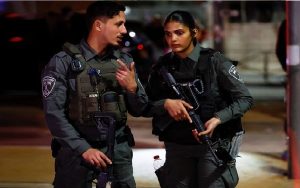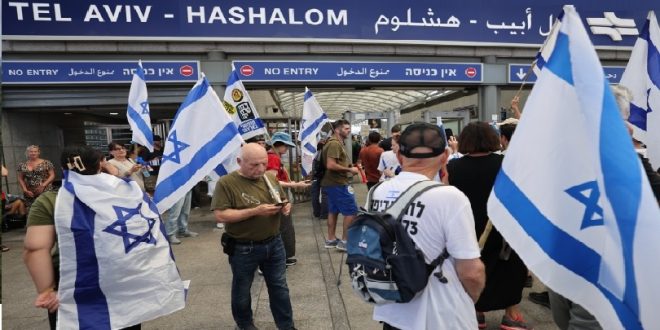20-07-2023
JERUSALEM: The voices of dissent from Israeli military veterans and reservists towards the country’s government are getting louder as protests against the “judicial reform” plans continue but after protests on Tuesday saw highways blocked, Israel’s military establishment is also pushing back, with army chief Herzl Halevi warning that “anyone who calls for not reporting (for reserve duty) harms” the Israeli forces and “security of the state”.
 Military protest group Brothers in Arms was one of the dozens who participated in the second weekly “day of disruption”, in which the voices of ex-soldiers have taken centre stage.
Military protest group Brothers in Arms was one of the dozens who participated in the second weekly “day of disruption”, in which the voices of ex-soldiers have taken centre stage.
Leading the way are the more than 10,000 reservist soldiers, including members of the elite intelligence unit 8200 and air force pilots, who have signed an online petition to “go to war for the soul of the nation”, threatening to boycott their reservist duty.
Retired army generals who spoke to Al Jazeera disagreed over the scope of the protesters’ harm to the army and its preparedness for a future conflict.
Amiram Levin, a former major-general and commander of the Israeli military’s northern command, insists that “the (reservists) are not threatening anything” and that it is the far right in the government that is “endangering the safety of the state of Israel”.
Army reservists are obligated to serve a set number of days by law until they are at least 40, and are frequently asked  to volunteer to serve longer on a less formal basis by their officers. In an emergency, the state can obligate its entire reserve force numbering 400,000 soldiers to report for duty.
to volunteer to serve longer on a less formal basis by their officers. In an emergency, the state can obligate its entire reserve force numbering 400,000 soldiers to report for duty.
“If the government betrays [the reservists] and violates agreements, and spits in their faces and endangers the safety of the nation, and sends them on potentially illegal missions in Judea and Samaria (the occupied West Bank) … they say, we will not volunteer, we will do the minimum that the law requires,” said Levin, outlining the protesters’ reasoning.
Levin further explained his view that the potentially negative effect of the reservists’ refusal to serve was a small risk compared with the much greater liability posed by a future in which soldiers served a “dictatorship”.
“The big thing is that an army of a dictator is a putrid army,” said Levin. “It is better to have a slightly less trained army (serving a) a democratic government when people believe in what they are fighting for.” (Al Jazeera)
 Pressmediaofindia
Pressmediaofindia




